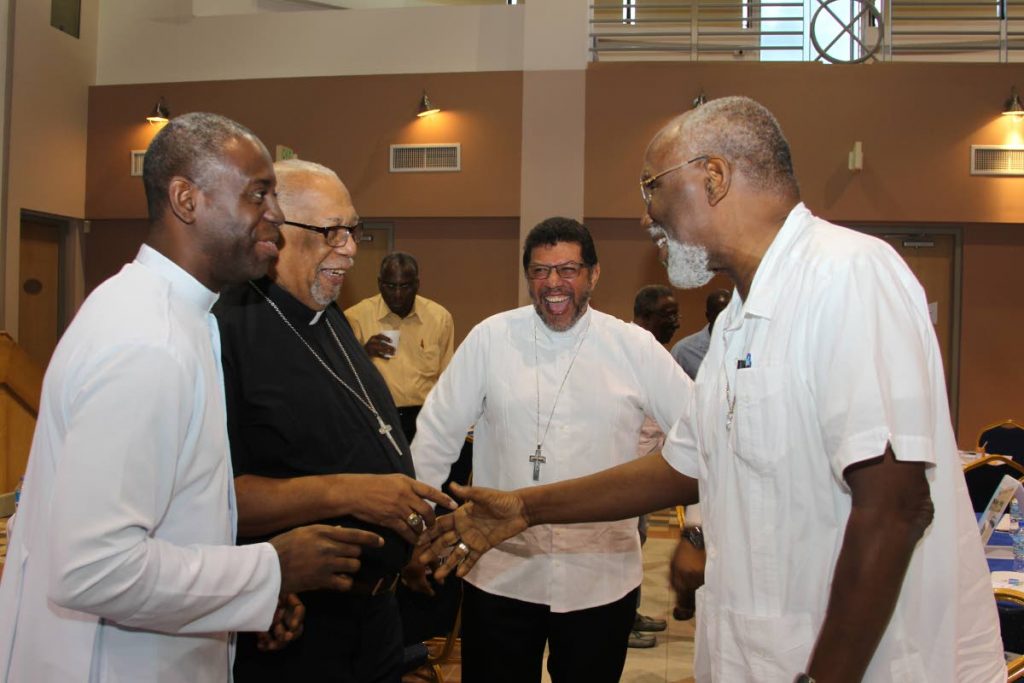Is ‘fake news’ worse than no news?

There is “fake news” in the church and “no news” that is equivalent to “fake news” and the churches are masters of “no news” where anything that can, presumably, come out of them is swept under the carpet says Bishop of Grenada Clyde Harvey.
“Fake news or no news. Which is the worse sin?” he asked rhetorically.
In an address yesterday at the Catholic News Symposium 2017 themed, “The Pursuit of Truth in the age of Fake News” at St Dominic’s Centre, Diego Martin, Harvey said, “We are living in an era where, if they do not get news from us, they will get them from elsewhere,” including social media.
Churches are attempting to shelter their congregations from what is going on, he said, because of the belief that bad news will damage their faith.
Though difficult, he said, people must use the truth to challenge the Church.
“There is the fear of the power of truth, when that truth challenges our positions of power,” he said.
He said the question was: how did one deal with the fear which was associated with challenging the church and opening oneself to scrutiny?
From his experience, he said, he has seen the Catholic News being fearful of applying critical investigative journalism to the diocese. He believed the 125-year-old weekly should have at least one investigative journalist who would raise questions fearlessly in pursuit of the truth.
“Catholic News is still struggling to live in context and to ask relevant and pertinent questions,” he said.
“The truth to challenge the church; that is not easy.”
He said the media were living communities that had relationships with the people. He said newspapers, including the Catholic News, saw themselves “as achieving purpose and shared life in many more ways than just the typewriter and the pen. A community that is not afraid of what the truth is. That is what good journalism ought to be about.”
He said when Vatican officials realised Pope Francis wanted to make press conferences an integral part of his ministry, many of them shivered in their boots.
Harvey recalled when Archbishop Anthony Pantin asked him to become the editor of Catholic News and he replied, “To possibly make it the ‘Tablet of the Caribbean?’” and Pantin never asked him the question again.
Harvey said the Church was aware of challenges that people continued to face but wondered if those challenges would be addressed by communities who saw and dared to assist by using their voices through their media.
He questioned whether religious voices were being silenced through Government patronage by the need to preserve whatever benefits that came from the ruling regime.
“Have the religious voices become so intertwined with the politics that there is no difference when the two speak?”
In TT, he said, “We have a particular crisis with the IRO (Inter Religious Organisation) which has become so intertwined that you have successive presidents who clearly identified with a political party. How does the Catholic News respond to that?
Of religious voices in the Caribbean, he cited several figures including the late Fr Andrew Morrison, editor of the Catholic Standard in Guyana who stood up against the Forbes Burnham regime during the 70s and was murdered in the line of duty.
He also noted that the religious identity of Archbishop of Kingston Samuel Carter one of the first locally appointed archbishops popularly called “Uncle Sam” lived on in Jamaica today.
Harvey said the recent experiences of Dominica and Grenada, which had been previously ravaged by Hurricane Ivan, should be seen as an invitation for a new beginning.
“If we can so preach the Gospel of Jesus Christ, when disaster strikes, we see it as an opportunity for resurrection,” he said.


Comments
"Is ‘fake news’ worse than no news?"